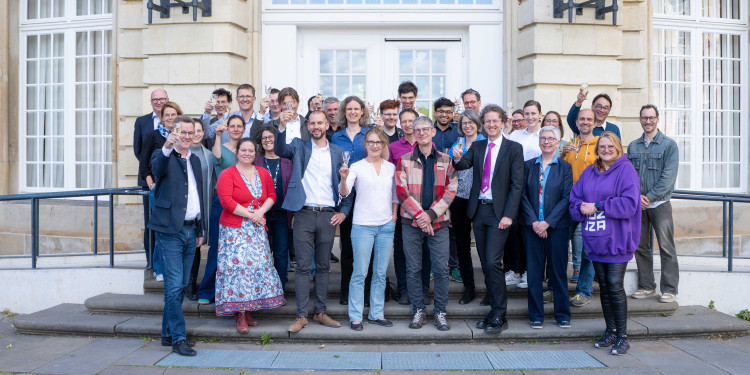
Excellent perspectives
Thinking outside the box to come up with new ideas: this is helpful not only in everyday life but also in mathematical research. “Thinking outside the box and combining various methods lead us onto new and sometimes surprising paths in the search for solutions to fundamental mathematical problems,” says Prof. Thomas Nikolaus. He and Prof. Mario Ohlberger are the spokespersons for the Cluster of Excellence “Mathematics Münster – Dynamics – Geometry – Structure”.
Collaboration between researchers from a variety of mathematical fields is at the core of the research alliance. This approach also convinced the Excellence Commission made up of researchers, as well as representatives of the national and regional state governments in Germany. Just a few days ago the Commission decided that “Mathematics Münster” was to receive Excellence funding for a further seven years from 1 January 2026.
“The increasing specialisation within mathematics can sometimes make collaboration between different areas of the field more challenging than working with nearby disciplines like physics or computer science,” says Mario Ohlberger, “consequently, joint projects often require an initial phase dedicated to clarifying fundamental concepts. The internationally recognised research findings from the Cluster's first funding phase clearly demonstrate the value of this preliminary work.”
The mathematicians involved have now further developed their so-called integrated approach and have identified current challenges which they plan to work on in ten networked research topics in the next funding period. The issues involved comprise the entire spectrum of mathematics: from basic theoretical research – for example into abstract invariants or connections between arithmetic and topology – to analysis of non-linear operators and spaces and other topics with practical applications. These latter include for example mathematical models in biology and medicine, as well as data-driven processes – and thus the mathematical foundations of artificial intelligence.
The two Mathematics Clusters in Bonn and Berlin are also to receive further funding. “This underscores the high regard for basic mathematical research in Germany and the recognition of its benefits for society,” says Mario Ohlberger. This, he explains, is because mathematics provides essential foundations for numerous other sciences and technologies. Exchanges with such areas are to be strengthened in future through specific programmes.
A substantial part of the funding – 40 million euros have been applied for – will be invested in brains. “Many of our working groups are among the best in their field worldwide,” says Thomas Nikolaus. “More top-flight researchers have been joining us over the past few years. We want to carry on this dynamic development and continue to make Münster a hot spot for excellent research. We aim to attract the brightest mathematical minds to our master’s, doctoral and postdoctoral programmes, enriching our research community and strengthening our position as a leading centre for mathematical research.” In addition, funding will be made available for research semesters, conferences and visiting academics with the aim of promoting exchanges between the 200 members of the Cluster as well as between members and external partners.
As a centre of mathematics, Münster will be offering even better conditions in future for collaboration: the new “Centre for Mathematics Münster” (CMM) research building will be opened in early 2027. “Fruitful collaboration often arises from chance encounters,” says Mario Ohlberger. The architecture of the research building is systematically geared towards making such spontaneous interactions possible, he says. The design – with a large atrium, courtyards with areas for interaction, moveable partition walls, and blackboards in front of transparent office walls – produces airiness and light, making it easier for researchers to think outside the box and produce new mathematical ideas.
Author: Victoria Liesche
In contrast to “Mathematics Münster”, the “Religion and Politics” Cluster of Excellence, which had been in existence since 2007, will not be receiving any further funding. The Cluster produced internationally acclaimed research work, and interdisciplinary religious research will continue to be a strong feature of the University of Münster’s profile. The research will be continued at the Campus of Theologies and Religious Studies which is due to be opened in 2026.
This article was originally published in the university newspaper wissen|leben No. 4, 12 June 2025.
